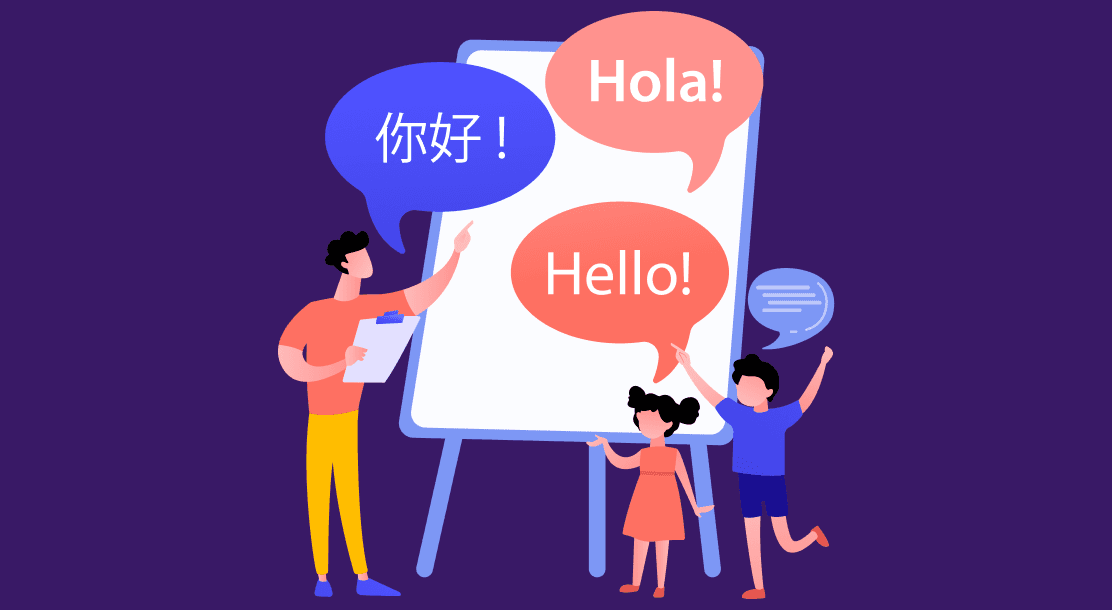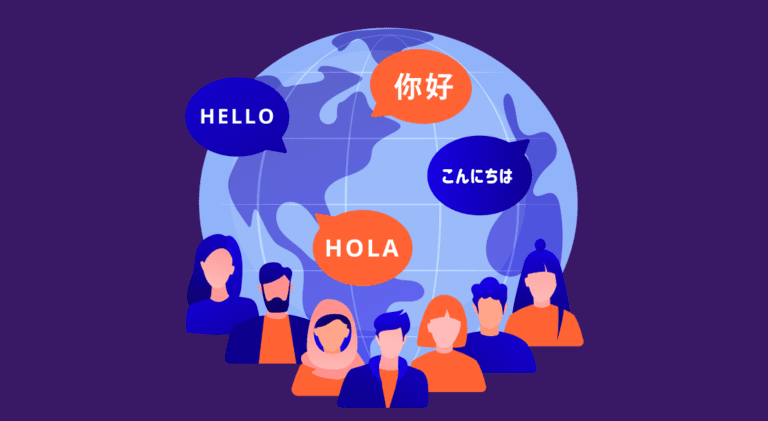
Most organizations may have believed they didn’t require translation services until, say, ten years ago, simply because no one was thinking of becoming global and/or because it was too expensive. However, we no longer live in that era; we now live in the digital age.
Even modest enterprises can go worldwide because of the internet. Businesses should learn about the importance of translation in this globalized landscape. This is where language translators step in.
Any company trying to expand to new areas would need material written in the local language. When information is not provided in a language that customers understand, the interaction between them and businesses becomes difficult.

Your website must, without a doubt, be available in several languages, regardless of where your company works. It doesn’t end there, though. Today, social media is a significant part of our lives, and it can help you reach a larger audience in a short amount of time.
Your fans may help you go viral by sharing, liking, commenting on, Tweeting, and pinning your content. Of course, unlike websites, social media content is updated on a daily basis, across numerous platforms, and often, multiple times a day.
What are the Functions of a Language Translator?
The following is a list of a few things a translator must do or consider while working on a translation:
● Take note of the original language’s intended meaning.
● Match the original language’s formatting.
● Know or look for the most appropriate phrase for the topic.
● Ensure that the completed translation is clear and accurate.
10 Tips for Hiring the Right Language Translator
How can you be confident you’re getting high-quality translations if you don’t know the target language? To limit the likelihood of translation errors from the outset, firms must collaborate closely with their translation vendor(s) to develop a process that leads to high-quality translation. This section will provide you with some pointers on how to make sure your translation business has quality practices in place.
1. Inspect the firm closely
The most reliable strategy to ensure consistent, high-quality translations is to work closely with your chosen translation supplier. Check ahead of time to discover if your translation service provider has experience with your industry and document type.
Make a detailed description of your target audience when you first start working with your language translator. Finally, remember that working with a translator necessitates dedication to continual improvement. Your vendor will require time to become acquainted with your company’s branding, goods, and personnel. The translation supplier will have a better grasp of your business over the course of three to six months, and from then on, the quality may improve.
2. Look for credibility
A translation provider might follow particular certifications and standards in each industry to demonstrate that they have systems in place to offer high-quality translations. In the industrial business, for example, having an ISO-certified translation provider is a must.

3. Before the start of the project, assess the translator
A competency exam is a typical way to evaluate translators or interpreters. On occasion, it can take the form of onsite testing. Most translators, whether freelance or in-house, will have to take such examinations several times throughout their careers.
Read the firm’s quality assurance policy if you’re not hiring a freelance or independent translator. Find out how thoroughly they screen their translators and interpreters ahead of time. This will assist you in avoiding logistical issues in the future.
4. Improve the existing text
If your source text isn’t written correctly in the original language, translators won’t be able to improve it. Improving your source content is the simplest and most effective way to enhance the overall quality of the output. It is not the translator’s job to correct errors in the source text.
Write a brief explanation to help the translator to comprehend the objective of your work. Consider the content’s purpose as well as the goals you want to achieve. The language translator will need to know who they are translating for in order to select the best and most relevant terms. Including basic details in your source content will be really beneficial.
5. Be precise about the turnaround time
Depending on the language and document, translation can be a time-consuming procedure. So if you need the job completed quickly, make sure you’ve given the translation firm a deadline and that they’ve agreed to it.

If you follow our second suggestion, you’ve most likely selected a reputable translation firm, and you shouldn’t be concerned about project delivery. It’s critical to keep an open channel of communication with your contractor, regardless of who you employ. You are more likely to obtain what you ask for if you are upfront about your project requirements and expectations.
6. Ensure the translator has expertise in the target language
Ensure that the translator knows the intricacies of language the content needs to be converted into. They should have a considerable amount of knowledge and experience in your chosen language. A good way to determine this is by looking at the language pairs they offer, and customer testimonials.
7. Look for an industry expert
In some businesses, learning jargon is as crucial as knowing the language itself. If the translator is not an expert in the field, then certain terms might be perplexing to them. To ensure that your multilingual communication resonates with your target audience, look for linguists who have extensive industry-specific knowledge. Check to see if they are recognized by any reputable translation association or board.
8. Identify what services the translator offers
If you’re entering a new market, you’ll likely have a range of translation requirements, ranging from website translation to document translation. If one translator is unable to meet all of your requirements, you will have to hunt for another and repeat the tiresome selection process. Plan ahead of time to ensure that you hire a translator that can meet all of your future requirements.
9. Consider quality assurance

Inquire about the agency’s quality control procedures and whether the translators’ work is reviewed by editors. To maintain consistency among translated content, ideally, the same group of linguists and translators should be working on all of your projects. Inquire about the agency’s employment procedure for the team. Freelance members should have suitable training and experience.
10. Consider confidentiality concerns
Inquire about the precautions taken by the professional translation service to keep your documents secret. Where will your documents be kept? Are language translators bound by confidentiality agreements? For particular initiatives, does the agency sign confidentiality agreements? Your translator must be aware of and able to meet your confidentiality standards.
Choose an agency that provides you with a single point of contact who will discuss your needs with you over the phone, via email, or in-person throughout the process. From beginning to end, the translation of your material should be a collaborative effort. Companies that only wish to deliver translations without dialogue should be avoided. It is not a transaction; it is about building a collaborative relationship to assist you in effectively communicating with your multilingual audience.
The foundation of your success is built on trust and collaboration between a company and the translator. Early in the planning stages of your project, start building a relationship with your translation partner. The more background information and documents you can provide your translation service with, the more likely they will generate excellent results.
Key Takeaways
● Look for a language translator that has a certain level of credibility in the market.
● Search for a professional that has a specific interest or expertise in the industry you are working in.
● Ensure you have a proper quality assurance team set up for analyzing the work of the translator.
● Seek client testimonials from the firm. This will give you more idea about how satisfied the previous customers were with them.
● Look for package services. Some firms offer you a package of multiple translation services. This way, you will get everything in one place, and at a much cheaper cost.
FAQs
By hiring a language translator, your translations will become precise. Text in the medical, legal, or financial professions, for example, might be quite complex and particular, with its own set of jargon. Working with a translation provider ensures that all material, no matter how specialized, is accurately translated.
Here are some benefits of hiring a language translator:
● You can speak to an international audience.
● Your readership will multiply, and it will be geographically unrestricted.
● You’ll have the chance to work on international concerns.
Companies need professional translation services for improved communication. Your company will never be able to get into the worldwide market until the language barrier is removed. When it comes to document translation, it’s vital to choose a professional translator or a seasoned translation business.
The most important thing for a translator is to read and comprehend the source language. Translators must be proficient in the source language. Translators should also keep up with how language progresses over time.
Latest Blogs
Explore how Google’s 2025 AI search updates triggered ranking chaos. Learn actionable strategies to adapt your SEO for AI Overviews, zero-click searches, and SERP volatility. Stay ahead now.
Learn how to rank on AI search engines like ChatGPT, Perplexity, and Gemini by optimizing your content for authority, structure, and relevance. Stay ahead in AI-driven search with this strategic guide.
Explore the best healthcare SEO services for your medical practice. Improve online visibility and effectively reach more patients in need of your services.
Get your hands on the latest news!
Similar Posts

Language
6 mins read
A Guide on How to Do Language Translation

Language
5 mins read
A Complete Guide to Advertisement Translation

Language
6 mins read